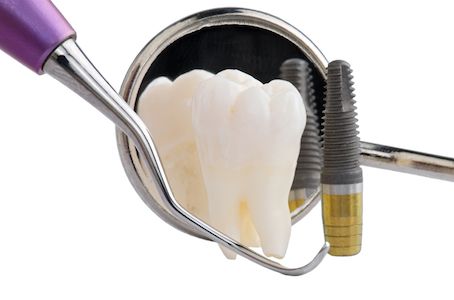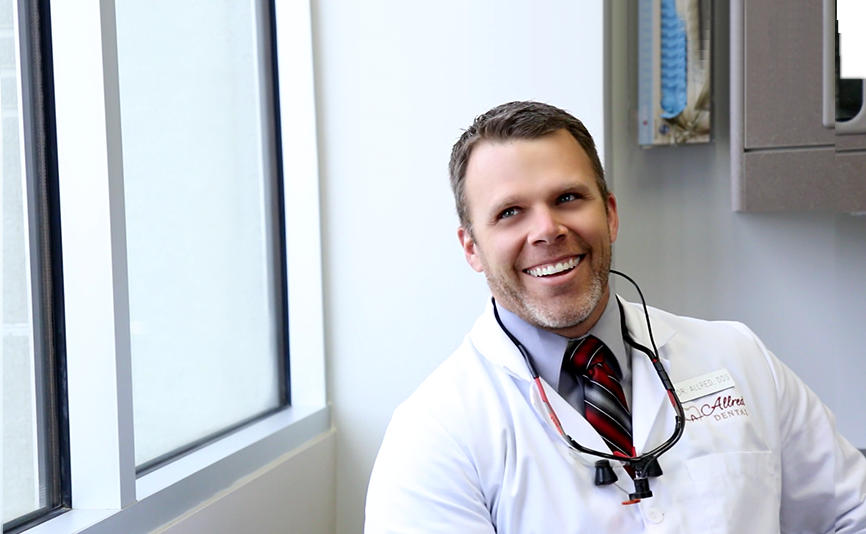
Are you looking for the top dental implants dentist near San Diego? Dr. Allred of Allred Dental is an expert in the field of dental implants, offering a range of systems including single dental implants, All-on-4® dental implants, implant-retained dentures, and more. Call today to schedule your no-pressure consultation!
Recovery Process Overview
Your dental professional will complete an assessment before they proceed with the dental implant steps. They will assess your needs and a personalized treatment plan will be created. This treatment plan influences the recovery process. For example, if you need several teeth extracted before the implants, there is additional recovery time involved.
If you need bone grafts for the dental implants to work, this will also increase the recovery time. Bone grafting is necessary if you lack enough bone to support the anchors placed into the gums. If you have one or more teeth missing for a year or longer, there is a good chance you will need bone grafting. Without this step, the dental implants won't be successful.
It can take several months to a year for the bone grafting to heal. The healing from that procedure must be complete before any of the dental implant steps are started. Your dental professional will examine the gums periodically to ensure the healing is progressing.
Both bone grafting and dental implant procedures can result in bruising or swelling around the face. This may last a few days or a couple of weeks. Over the counter medications can help reduce the swelling and take care of discomfort. Ice packs can help too by applying them several times a day.
Most procedures involve the use of self-dissolving stitches. They will help to prevent infection and help stop the bleeding. They will be absorbed by the body. In other procedures, it will be necessary to return to the office so the stitches can be removed. Typically, the more implants and the more teeth you have replaced, the longer the healing time. Some patients only get one tooth replaced. Others are getting several at the same time or for their entire mouth.
It can take up to six weeks to fully recover from dental implant procedures. This is only an average though. Some patients feel better in a few weeks, and for others, it takes a couple of months. Pay attention to how you feel and report any painful sensations or discomfort areas of the mouth to your dentist.
Early Weeks of Recovery
Communication with your dental office is important during the early weeks of recovery. They will follow-up with you regularly. This will include phone calls and office visits. The most discomfort should be the first week. It is best to rest as much as you can and limit activities. Try to take some time off work if you can.
By the second week, the discomfort should be much less than it was the week before. Any swelling, bruising, or bleeding should be gone or significantly improved. If you still have discomfort three months after the implant process, your dentist may be concerned. They may evaluate your mouth for signs of nerve damage, infection, or signs your body is rejecting the implant. If they discover anything unusual they will work with you to correct it.
How to Speed Up Recovery
Give your body time to heal. Plan to take several days off when you get dental implants. Sleep when you can and focus on healing. Take a break from strenuous activities including going to the gym. If your job is labor-intensive, talk to them in advance to take time off or get a modified job assignment.
Pay attention to what you eat during the dental implant recovery process. Eat approved foods that are soft. If you eat foods that can cause discomfort or irate the implant it will take longer to heal. Make sure you don't skip meals and consume plenty of protein. A well-balanced diet gives your body the vitamins and nutrients you need to promote healing.
For the first few days, you may need to stick to an all-liquid diet. If that goes well you can slowly introduce soft foods. Plan ahead to make sure you have items you can consume on hand. Soup can be filling and easy to eat while your implants heal. You can also indulge a bit with ice cream or milkshakes. Try to avoid extremely hot food as that will promote swelling. Food can be warm but not hot.
Drink plenty of water during the healing process. This will help your body flush out toxins. It will reduce the risk of an infection developing. Avoid food that may get stuck around the implant area. This includes:
- Nuts
- Popcorn
- Rice
- Seeds
Follow good oral hygiene habits during the healing process. Your dental professional will explain what to do during the healing process. Take the time to brush and floss properly and rinse several times per day. Don't brush vigorously as that can irritate the gums, cause swelling, and promote bleeding.
If it hurts to brush certain areas, clean them gently. Use rinses of warm water and salt throughout the day. You may find regular mouthwash is too harsh in the early recovery stages. Tell your dentist if your mouth seems overly sensitive. Drinking plenty of water will also help keep your mouth cleaner during the healing.
You may have unique instructions for your particular treatment plan. Pay close attention to those details. Following them can play a significant role in the recovery time. Know the signs of infection and reach out to your provider immediately if you notice any symptoms. The sooner an infection is stopped the faster you can get back to the recovery process.
You may be given antibiotics to fight the risk of infection. If there is decay in the mouth, they may be given to destroy it. Make sure you take the antibiotics as directed. Don't skip days and take them until the entire prescription is gone. Store them in a dark location away from direct sunlight.
What to Avoid During Recovery
Be mindful of what you eat during the dental implant recovery process. Avoid hard food and sticky food choices. Avoid food that can get stuck around the implant area as it may promote infection.
Make sure you maintain your prescribed oral care routine, several times per day. Don't allow bacteria to grow during the healing process. This can lead to an infection, and prolong the amount of time it will take for you to recover.
Smoking isn't recommended during dental implant recovery. The use of chew isn't a good idea either. It will get lodged between your teeth and it can irritate the gums. The use of tobacco products will slow down the natural healing process.
Alcohol should be avoided while you heal from dental implants. Don't be tempted to have a few drinks. Alcohol dehydrates the body, and you need to stay hydrated to promote healing. Alcohol should never be missed with any over the counter or prescription medications. You may be using such products to help you remain comfortable while you heal.
Illegal drugs should never be used during the recovery process. They can cause serious health problems for you. They can slow down the healing process and increase the risk of infection. Some prescription medications can't be taken while healing because they can cause blood to clot or not clot as it should. For example, blood thinner medications.
Make sure your dental professional is aware of all medications and supplements you take before the procedure. They will share with you what you must stop taking and when you can resume using it again.
Ask Questions
If you aren't sure what to do ask questions. Your dental professional and all the staff are there to help you. They will explain what steps you should take to heal. If you get confused or forget something call them. If you have questions after you are home pick up the phone and call them. They will be happy to help you. Don't make assumptions or cut corners as that could prolong your healing time.
Individual Healing Times Vary
It is important to understand individual healing times vary. Some people heal in less time than others, so the timeframes given are estimated. Your dental professional will see you at regular intervals to evaluate your healing. Make sure you follow all instructions and keep all scheduled appointments. If anything seems out of the ordinary or you get a fever make sure you reach out to them and share your concerns.
Trust Allred Dental!
Dr. Allred is here to transform your smile with dental implants. Call today to schedule your no-pressure implant consultation.


